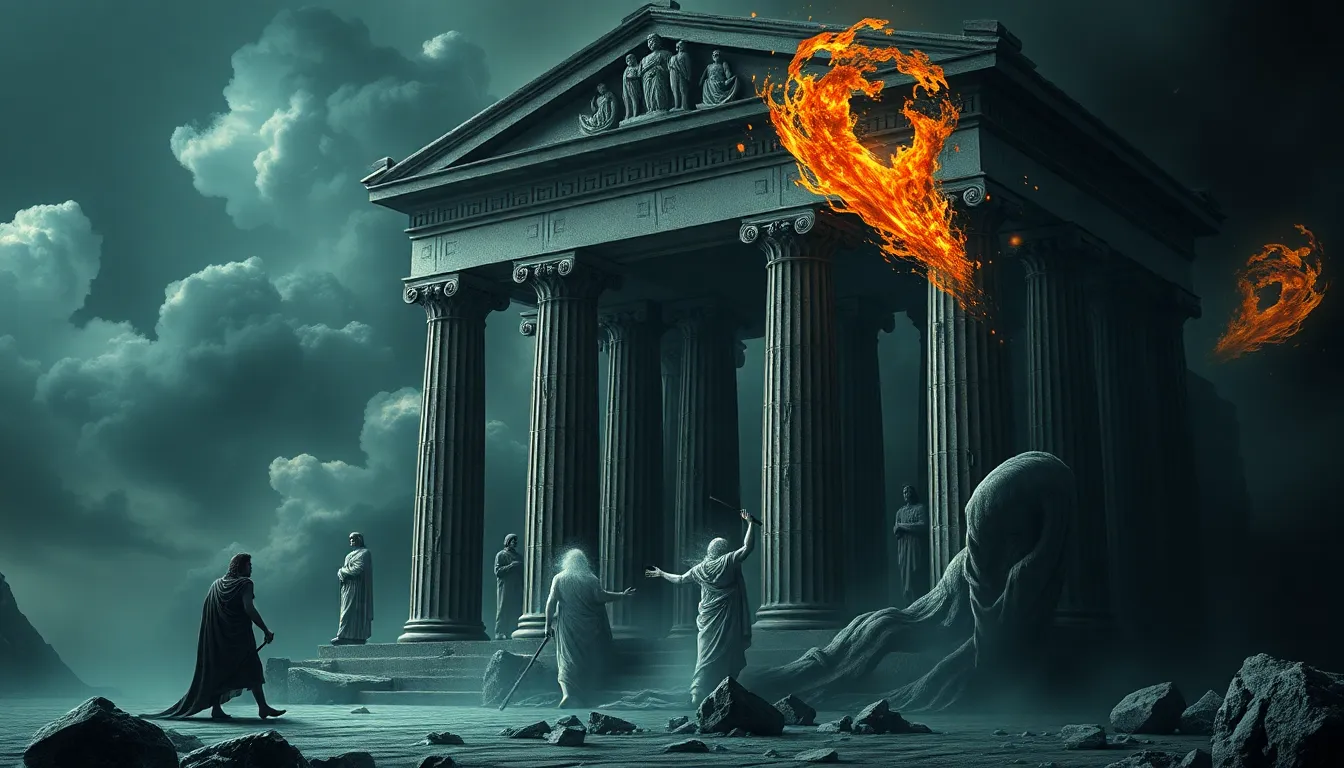The Cultural Significance of Chaos in Ancient Greek Society
I. Introduction
Chaos, in the context of ancient Greek culture, refers not only to disorder and confusion but also to a primordial state from which the cosmos emerged. This concept has profound implications in Greek thought, influencing philosophy, mythology, and societal norms.
As a philosophical and literary theme, chaos encapsulates the struggles between order and disorder, creation and destruction, and the inherent uncertainties of human existence. Understanding chaos allows us to gain insights into the ancient Greek worldview and the ways in which they perceived their environment and society.
This article aims to explore the significance of chaos in ancient Greek society, examining its philosophical roots, mythical representations, literary depictions, and its broader implications on politics and psychology.
II. The Philosophical Underpinnings of Chaos
Chaos finds its early expressions in pre-Socratic philosophy, where thinkers like Hesiod and Anaximander conceptualized it as the initial state of existence. Hesiod’s “Theogony” introduces chaos as a primordial void, laying the groundwork for subsequent cosmological theories.
In the works of Plato, chaos is often associated with the idea of disorder in the material world, contrasting with the realm of Forms, which represents perfect order. Aristotle, on the other hand, views chaos as a necessary precursor to the ordered cosmos, emphasizing the importance of potentiality and actuality in understanding existence.
Overall, chaos serves as a foundational concept in Greek cosmology, illustrating how the Greeks grappled with the complexities of existence and the origins of the universe.
III. Chaos in Mythology and Religion
In Greek mythology, chaos is vividly represented as the primordial entity from which all creation springs. The ancient Greeks believed that from chaos emerged Gaia (Earth), Tartarus (the Abyss), and Eros (Love), signifying the birth of the universe and the establishment of order.
- Chaos as a primordial entity: Represents the initial state before creation.
- Creation myths: Chaos is a crucial element in stories explaining the origins of gods and the cosmos.
Rituals and practices in ancient Greece often aimed to invoke order from chaos. These included sacrifices to deities associated with harmony, such as Athena, and rites intended to restore balance in the community during times of upheaval.
IV. Chaos in Literature and the Arts
Ancient Greek literature frequently depicts chaos as a significant theme. In Homer’s “Iliad” and “Odyssey,” chaos manifests in the form of war, strife, and the unpredictable nature of human fate. Hesiod’s works further elaborate on the chaotic origins of the world and its subsequent ordering.
The influence of chaos extends to Greek tragedy, where playwrights like Aeschylus and Euripides explore themes of human suffering and the disorder of the cosmos. In comedy, chaos serves as a backdrop for the disruption of societal norms, often leading to eventual reconciliation and restoration of order.
Artistically, chaos is represented in sculpture and pottery, where dynamic forms and turbulent scenes illustrate the tension between order and disorder. These visual arts reflect the cultural preoccupation with chaos and its implications for human experience.
V. Political Chaos and Its Influence on Society
Political upheaval in ancient Greek city-states often led to chaos, impacting social structures and governance. The Peloponnesian War, for instance, exemplified how chaos could disrupt established order, leading to a reevaluation of political systems.
- Chaos as a catalyst: Political chaos prompted calls for social reform and the establishment of democratic ideals in Athens.
- Responses to chaos: Different city-states adopted varying approaches, from democracy to tyranny, to restore order and stability.
This interplay between chaos and political dynamics highlights the ancient Greeks’ understanding of governance and their attempts to create a balanced society amidst turmoil.
VI. The Psychological and Emotional Dimensions of Chaos
Chaos serves as a powerful metaphor for human experience and emotion in ancient Greek thought. The unpredictability of life and the inherent struggles faced by individuals resonate deeply within the framework of chaos.
In literature, chaos often reflects the internal conflicts of characters, embodying their fears, desires, and the chaotic nature of existence itself. This exploration of chaos shapes Greek identity and values, emphasizing resilience in the face of uncertainty.
VII. Legacy of Chaos in Later Greek and Western Thought
The concept of chaos evolved significantly during the Hellenistic and Roman periods, influencing philosophical discourse and scientific inquiry. Thinkers such as Epicurus and the Stoics grappled with chaos, integrating it into their understandings of nature and existence.
Moreover, ancient Greek notions of chaos have left a lasting impact on modern philosophy and science. The duality of order and chaos continues to be relevant in contemporary discussions, particularly in fields such as chaos theory and systems thinking.
VIII. Conclusion
In summary, chaos has played a vital role in shaping ancient Greek culture, from its philosophical roots to its manifestations in mythology, literature, and politics. The enduring significance of chaos reflects the complexities of human existence and the constant struggle for order amidst disorder.
As we reflect on the cultural narratives surrounding chaos, it becomes clear that further research into this theme in ancient societies can provide valuable insights into our modern understanding of chaos and order.




